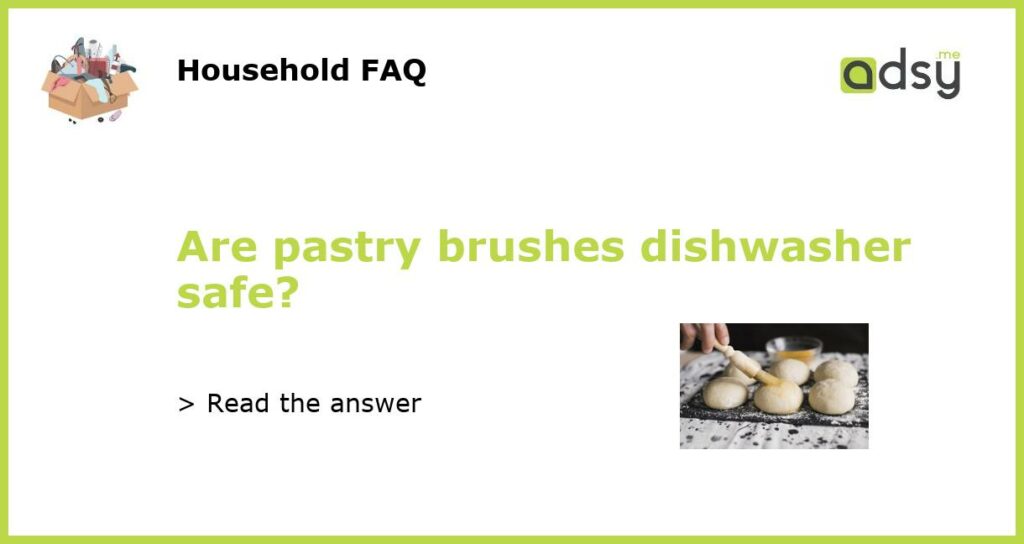Yes, pastry brushes can generally be washed in the dishwasher
Pastry brushes are a commonly used tool in baking and cooking, and they can become quite messy after use. Many people wonder if these brushes can be washed in the dishwasher for easy cleaning. The good news is that most pastry brushes are dishwasher safe and can be cleaned effectively in this way. Let’s take a closer look at why pastry brushes are dishwasher safe and some tips for properly cleaning them.
Why are pastry brushes dishwasher safe?
Pastry brushes are typically made from materials such as silicone or natural bristles. These materials are generally resistant to the high temperatures and vigorous water flow found in dishwashers. In addition, the handles of pastry brushes are usually made from materials such as plastic or wood, which are also dishwasher safe. However, it is important to check the manufacturer’s instructions or packaging to ensure that the specific brush you have is indeed dishwasher safe. Some brushes may have parts, such as metal ferrules or wooden handles, that may not be suitable for dishwasher cleaning.
Tips for cleaning pastry brushes in the dishwasher
If you want to clean your pastry brush in the dishwasher, here are a few tips to ensure optimal cleaning and prolong the lifespan of your brush:
1. Check the manufacturer’s instructions: Before placing your pastry brush in the dishwasher, read the manufacturer’s instructions or packaging to ensure that it is dishwasher safe. This will help avoid any damage or discoloration that may occur from improper cleaning.
2. Rinse off excess food residue: Before placing your pastry brush in the dishwasher, rinse off any excess food residue under warm water. This will help prevent any food particles from getting stuck in the bristles during the dishwasher cycle.
3. Place the brush securely: When loading your pastry brush into the dishwasher, make sure to place it securely in a utensil holder or rack to prevent it from moving around during the wash cycle. This will help ensure thorough cleaning and prevent any damage to the brush or your dishwasher.
4. Use a gentle dishwasher cycle: When selecting a dishwasher cycle for your pastry brush, choose a gentle or delicate setting to avoid any potential damage to the bristles or handle of the brush. Avoid using a high-temperature or heavy-duty cycle, as this may cause the bristles to melt or become distorted.
5. Allow the brush to dry completely: After the dishwasher cycle is complete, remove the pastry brush and allow it to air dry completely before storing it. This will help prevent any moisture buildup that can lead to mold or mildew growth.
Alternatives to dishwasher cleaning
If your pastry brush is not dishwasher safe or if you prefer not to clean it in the dishwasher, there are alternative methods you can use to clean it effectively:
1. Handwashing: Fill a bowl or sink with warm soapy water and gently handwash the pastry brush using a mild dish soap. Rinse thoroughly and allow it to air dry before storing.
2. Vinegar soak: Fill a bowl or container with equal parts white vinegar and warm water. Soak the pastry brush in the vinegar solution for a few hours or overnight, then rinse thoroughly and allow it to air dry.
3. Baking soda paste: Mix baking soda with enough water to form a paste. Apply the paste to the bristles of the pastry brush and gently scrub. Rinse thoroughly and allow it to air dry.
In summary, most pastry brushes are dishwasher safe and can be effectively cleaned in the dishwasher. However, it is important to check the manufacturer’s instructions or packaging to ensure that the specific brush you have is indeed dishwasher safe. If your pastry brush is not dishwasher safe, or if you prefer not to clean it in the dishwasher, there are alternative methods such as handwashing, vinegar soak, or baking soda paste that can be used to clean it effectively. Properly cleaning and maintaining your pastry brush will help ensure its longevity and keep it in good condition for all your baking and cooking needs.






